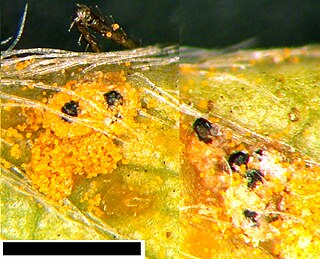
Sordariomycetes is a class of fungi in the subdivision Pezizomycotina (Ascomycota). It is the second-largest class of Ascomycota, with a worldwide distribution that mostly accommodates terrestrial based taxa, although several can also be found in aquatic habitats. Some are phytopathogens that can cause leaf, stem, and root diseases in a wide variety of hosts, while other genera can cause diseases in arthropods and mammals.

Stachybotrys is a genus of molds, hyphomycetes or asexually reproducing, filamentous fungi, now placed in the family Stachybotryaceae. The genus was erected by August Carl Joseph Corda in 1837. Historically, it was considered closely related to the genus Memnoniella, because the spores are produced in slimy heads rather than in dry chains. Recently, the synonymy of the two genera is generally accepted. Most Stachybotrys species inhabit materials rich in cellulose. The genus has a widespread distribution and contained about 50 species in 2008. There are 88 records of Stachybotrys on Species Fungorum, of which 33 species have DNA sequence data in GenBank. Species in the genus are commonly found in soil, plant litter and air and a few species have been found from damp paper, cotton, linen, cellulose-based building materials water-damaged indoor buildings, and air ducts from both aquatic and terrestrial habitats.

Pleosporaceae is a family of sac fungi. They are pathogenic to humans or saprobic on woody and dead herbaceous stems or leaves.

Phyllachoraceae is a family of sac fungi.
Holmiella is a genus of fungi in the order Patellariales.
The Lophiostomataceae are a family of fungi in the order Pleosporales. Taxa have a widespread distribution, especially in temperate regions, and are saprobic or necrotrophic on herbaceous and woody stems.
The Melanommataceae are a family of fungi in the order Pleosporales. Taxa are widespread in temperate and subtropical regions, and are saprobic on wood and bark.

The Phaeosphaeriaceae are a family of fungi in the order Pleosporales. Species in the family have a cosmopolitan distribution, and are generally nectrotrophic or saprobic on a wide range of plants.
The Sporormiaceae are a family of fungi in the order Pleosporales. Taxa have a cosmopolitan distribution and are saprobic on dung (coprophilous) and rotting vegetation.
The Didymosphaeriaceae are a family of fungi in the order Pleosporales. The family was erected by Anders Munk in 1953.

Gnomoniaceae is a family of fungi in the order Diaporthales. The family was circumscribed by German botanist Heinrich Georg Winter in 1886.
Kalmusia is a genus of fungi in the family Didymosphaeriaceae. The genus was formerly placed in family Montagnulaceae, before that was dissolved. The widespread, genus was estimated to contain about 12 species in 2008, which has increased to 29 species in 2023.
The Chaetosphaeriales are an order of fungi within the class Sordariomycetes.
The Hyponectriaceae are a family of fungi, that was formerly in the order Xylariales. It was placed in the Amphisphaeriales order in 2020.
Phomatospora is a genus of fungi within the class Sordariomycetes, and since 2016, in the family Phomatosporaceae and order Phomatosporales. They are found in terrestrial, freshwater and marine habitats, across the world except Russia and Canada.
Appendicospora is a genus of fungi in the family Apiosporaceae.

Sydowiellaceae is family of fungi in the order Diaporthales.

Glomerellales is an order of ascomycetous fungi within the subclass Hypocreomycetidae (Sordariomycetes). The order includes saprobes, endophytes and pathogens on plants, animals and other fungi with representatives found all over the world in varying habitats.
The Lentitheciaceae are a family of fungi in the order of Pleosporales. They are found world-wide with the greatest contributions found in Europe and Australia.
The Amphisphaeriales are an order of fungi within the class Sordariomycetes and subclass Xylariomycetidae.







